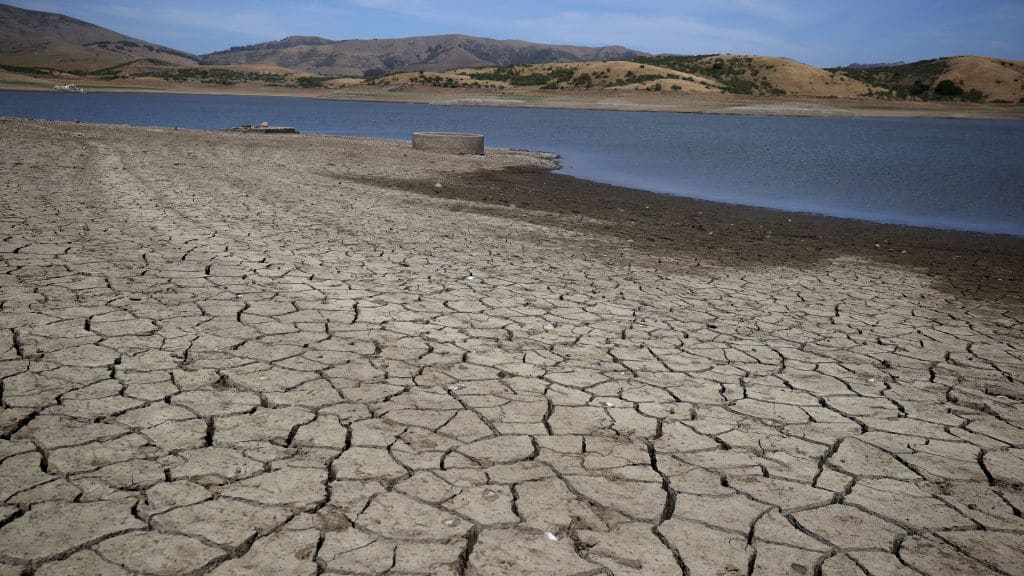New study finds Western U.S. megadrought is the worst in 1,200 years


A free daily email with the biggest news stories of the day – and the best features from TheWeek.com
You are now subscribed
Your newsletter sign-up was successful
The Western United States is the driest it has been in at least 1,200 years, a new study finds.
The region is experiencing a megadrought, now in its 22nd year, and 2021 was one of the driest years ever recorded, researchers wrote in a study published Monday in the journal Nature Climate Change. The megadrought does not show signs of getting better anytime soon, the researchers said, and it's believed that 42 percent of it can be directly attributed to human-caused climate change triggered by the burning of fossil fuels, The Associated Press reports.
Park Williams, a climate hydrologist at the University of California Los Angeles and the study's lead author, said climate change is "changing the baseline conditions toward a drier, gradually drier state in the West and that means the worst-case scenario keeps getting worse. This is right in line with what people were thinking of in the 1900s as a worst-case scenario. But today I think we need to be even preparing for conditions in the future that are far worse than this."
The Week
Escape your echo chamber. Get the facts behind the news, plus analysis from multiple perspectives.

Sign up for The Week's Free Newsletters
From our morning news briefing to a weekly Good News Newsletter, get the best of The Week delivered directly to your inbox.
From our morning news briefing to a weekly Good News Newsletter, get the best of The Week delivered directly to your inbox.
The researchers studied soil moisture levels in California, Wyoming, Utah, Nevada, Arizona, most of Oregon and Idaho, and much of New Mexico, western Colorado, northern Mexico, and the southwest corners of Texas and Montana. Using tree rings, they were able to get estimates dating back to the year 800.
Williams began studying the current megadrought a few years ago, and didn't believe it would last as long as a severe, 23-year megadrought that took place in the 1500s. Usually, megadroughts start to get better after 20 years, but Williams said that even though 2019 was a wet year, 2020 and 2021 were extremely dry and "we're nowhere close to the end."
Roughly 55 percent of the Western U.S. is in drought, and Williams said while the megadrought will end if there are a few good years of rain, another one will quickly replace it. Jonathan Overpeck, dean of the School for Environment and Sustainability at the University of Michigan, told AP that the study, which he was not part of, is "an important wake-up call. Climate change is literally baking the water supply and forests of the Southwest, and it could get a whole lot worse if we don't halt climate change soon."
A free daily email with the biggest news stories of the day – and the best features from TheWeek.com
Catherine Garcia has worked as a senior writer at The Week since 2014. Her writing and reporting have appeared in Entertainment Weekly, The New York Times, Wirecutter, NBC News and "The Book of Jezebel," among others. She's a graduate of the University of Redlands and the Columbia University Graduate School of Journalism.
-
 How the FCC’s ‘equal time’ rule works
How the FCC’s ‘equal time’ rule worksIn the Spotlight The law is at the heart of the Colbert-CBS conflict
-
 What is the endgame in the DHS shutdown?
What is the endgame in the DHS shutdown?Today’s Big Question Democrats want to rein in ICE’s immigration crackdown
-
 ‘Poor time management isn’t just an inconvenience’
‘Poor time management isn’t just an inconvenience’Instant Opinion Opinion, comment and editorials of the day
-
 How climate change is affecting Christmas
How climate change is affecting ChristmasThe Explainer There may be a slim chance of future white Christmases
-
 Blue Origin launches Mars probes in NASA debut
Blue Origin launches Mars probes in NASA debutSpeed Read The New Glenn rocket is carrying small twin spacecraft toward Mars as part of NASA’s Escapade mission
-
 Why scientists are attempting nuclear fusion
Why scientists are attempting nuclear fusionThe Explainer Harnessing the reaction that powers the stars could offer a potentially unlimited source of carbon-free energy, and the race is hotting up
-
 Dinosaurs were thriving before asteroid, study finds
Dinosaurs were thriving before asteroid, study findsSpeed Read The dinosaurs would not have gone extinct if not for the asteroid
-
 Canyons under the Antarctic have deep impacts
Canyons under the Antarctic have deep impactsUnder the radar Submarine canyons could be affecting the climate more than previously thought
-
 SpaceX breaks Starship losing streak in 10th test
SpaceX breaks Starship losing streak in 10th testspeed read The Starship rocket's test flight was largely successful, deploying eight dummy satellites during its hour in space
-
 NASA is moving away from tracking climate change
NASA is moving away from tracking climate changeThe Explainer Climate missions could be going dark
-
 Rabbits with 'horns' sighted across Colorado
Rabbits with 'horns' sighted across Coloradospeed read These creatures are infected with the 'mostly harmless' Shope papilloma virus
